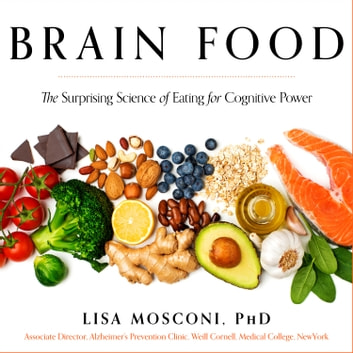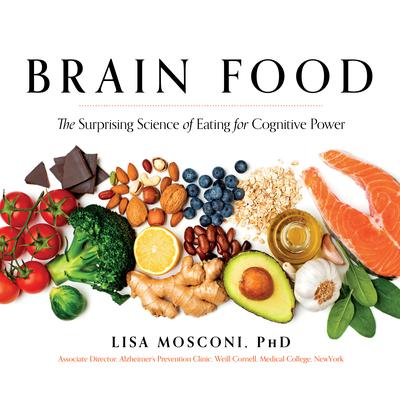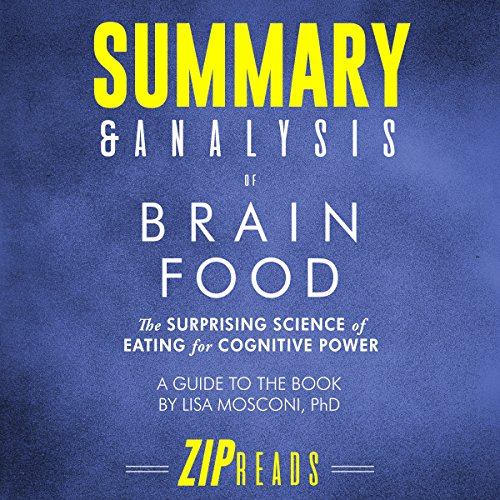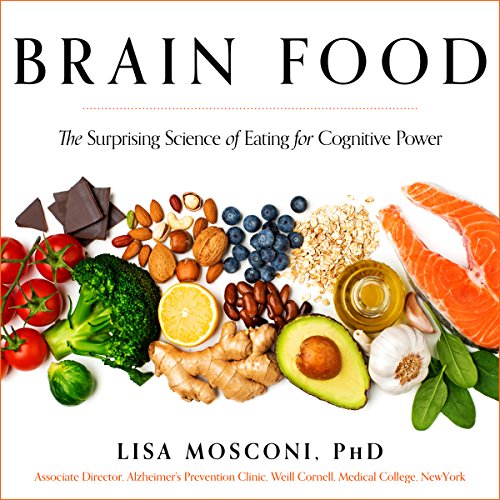“Brain Food” by Lisa Mosconi Ph.D. Explores how nutrition impacts brain health. The audiobook offers actionable advice for a sharper mind.
Lisa Mosconi, a neuroscientist and nutrition expert, delves deep into the science of brain health in “Brain Food. ” She emphasizes the importance of nutrition in maintaining cognitive function and preventing mental decline. Mosconi blends cutting-edge research with practical tips, making complex information accessible.
She outlines specific foods that support brain health and explains why they’re effective. Her engaging narration makes the audiobook both informative and enjoyable. This guide is essential for anyone interested in optimizing their brain health through diet. By following Mosconi’s advice, listeners can improve memory, focus, and overall mental performance.
Introduction To ‘brain Food’ By Lisa Mosconi
Lisa Mosconi is a well-known neuroscientist. She specializes in brain health and nutrition. She holds a PhD in Neuroscience. Lisa is also a nutritionist. She combines these fields to understand brain health. Lisa works at the New York University. She is the director of the Women’s Brain Initiative. She has written many articles and books. Her work is often featured in the media.
‘Brain Food’ explains how diet affects brain health. Lisa Mosconi shares research on this topic. The audiobook is easy to understand. It covers how different foods impact the brain. Lisa gives tips on what to eat for a healthy brain. She also discusses foods to avoid. The audiobook includes meal plans and recipes. It is a practical guide for brain health. This book is helpful for everyone. It makes complex science simple.
Link Between Diet And Cognitive Function
Studies show a strong link between diet and brain health. Eating healthy foods helps the brain stay sharp. Nutrients found in fruits, vegetables, and fish support brain function. Omega-3 fatty acids are especially important. They help improve memory and learning. Vitamins like B, D, and E also play a key role. They protect the brain from damage. Research suggests that poor diet can lead to cognitive decline. High sugar and processed foods harm brain health. They cause inflammation and oxidative stress.
Healthy eating is crucial for mental well-being. Good nutrition can boost mood and energy levels. Whole grains, lean proteins, and healthy fats are beneficial. These foods provide steady energy. Antioxidants found in berries and nuts fight stress. Unhealthy foods can make you feel tired and sad. High-fat and sugary foods can lead to depression. Balanced meals are key to good mental health. Eating a variety of foods ensures you get all the nutrients you need.
Key Nutrients For Optimal Brain Health
Vitamins like B6, B12, and E are crucial for brain health. These help with memory and cognitive function. Minerals like zinc and magnesium also play a big role. They support neurotransmitter function and mental clarity. Iron is vital for oxygen flow in the brain. Lack of iron can lead to fatigue and poor concentration.
Omega-3 fatty acids are essential for brain development. They help build cell membranes in the brain. DHA, a type of omega-3, is especially important. It supports synaptic plasticity and learning ability. Healthy fats from foods like avocados and nuts also provide energy. These fats keep the brain functioning well.

Debunking Common Brain Food Myths
Superfoods are often seen as magical. People think they boost brain power instantly. But a balanced diet is more important. Fruits, vegetables, and grains all play a role. They work together to keep the brain healthy. Eating a variety of foods is key. Superfoods alone cannot provide all nutrients. The brain needs many different vitamins and minerals. A balanced diet covers all bases.
Many claims about brain foods are not true. Some say fish makes you smarter. Fish is good but won’t make you a genius. Eating nuts is said to improve memory. Nuts help but cannot fix all memory problems. Broccoli is called a brain booster. Broccoli is healthy but not a miracle food. Always check the facts before believing claims. Science supports a balanced diet over single superfoods. The brain thrives on variety.
Brain Food For Different Life Stages
Children need healthy fats for brain growth. Foods like avocados and nuts are great. Teens need protein for brain development. Eggs and fish are good sources. Adults need antioxidants to keep the brain sharp. Berries and dark chocolate help. Eating right at every age supports brain health.
Older adults need more omega-3 fatty acids. These help to fight memory loss. Salmon and flaxseeds are rich in omega-3. Vitamin B12 is also crucial. It supports nerve function. Eggs and dairy are good options. Staying hydrated is key. Water keeps the brain functioning well. Eating a balanced diet helps aging brains stay healthy.

Dietary Patterns And Brain Disorders
Eating the right foods can help the brain stay healthy. Fruits and vegetables are very important. Berries, leafy greens, and nuts are great for the brain. Omega-3 fatty acids found in fish can also help. Whole grains and olive oil are good choices too. Avoiding processed foods is key. Sugar and unhealthy fats can harm brain health. Staying hydrated is also crucial. Water helps the brain function well.
Certain foods can help with neurological diseases. Turmeric has anti-inflammatory properties. It can help with Alzheimer’s disease. Berries can reduce brain inflammation. They are rich in antioxidants. Omega-3 fatty acids are helpful for depression. They improve brain function. Leafy greens can support brain health. They are full of vitamins. Reducing sugar intake can help prevent neurological problems. Too much sugar can damage brain cells.
Practical Tips For Brain-healthy Eating
Start your day with a rich breakfast. Include whole grains, nuts, and fruits. These foods provide lasting energy. For lunch, opt for leafy greens and lean proteins. They support brain function and focus. Dinner can be light yet nutritious. Think of fish, beans, and colorful vegetables. Always stay hydrated with water or herbal teas.
Snack smart with nuts and seeds. They are rich in omega-3 fatty acids. Add berries to your yogurt or cereal. Berries are packed with antioxidants. Swap white bread with whole grain options. Whole grains improve brain health. Use olive oil instead of butter. Olive oil is heart and brain friendly. Add turmeric and cinnamon to your dishes. These spices fight inflammation.
Beyond Diet: Lifestyle Factors Affecting Brain Health
Regular exercise boosts brain health. It improves memory and thinking skills. Exercise increases blood flow to the brain. Sleep is also crucial. A good night’s sleep helps the brain function properly. During sleep, the brain forms new pathways. These pathways help you learn and remember information. Poor sleep can harm brain health. It makes you forgetful and less focused. Both exercise and sleep are vital for a healthy brain.
Managing stress is important for the brain. High stress levels can damage brain cells. It can lead to memory problems. Practicing relaxation techniques can help. Techniques like meditation and deep breathing are useful. They help reduce stress and improve mental wellness. A positive mindset also helps. Staying mentally active is key. Reading, puzzles, and learning new skills keep the brain sharp. Good mental health supports overall brain function.
Critique And Reviews Of ‘brain Food’
Experts love Lisa Mosconi’s work. They find her advice practical and clear. Many agree that her tips can boost brain health. Scientists praise her for using solid research. Nutritionists say her food suggestions are easy to follow. Doctors appreciate her focus on preventive care. Her book is seen as a great resource for healthy living.
Readers and listeners give glowing reviews. They find the audiobook engaging and informative. Many say it changed their eating habits. Some noticed better focus and memory. Parents recommend it for teaching kids about good food. Older adults feel it helps them stay sharp. Overall, the feedback is overwhelmingly positive.
Expanding Beyond The Audiobook
Books and articles can help you learn more. Websites and blogs offer free tips and recipes. Workshops and webinars teach you directly. Podcasts are great to listen to while traveling. Apps can track your eating habits. Community groups give support and advice.
Scientists are studying how food affects the brain. New diets could help with memory. Technological advancements make research faster. Personalized nutrition plans might become common. Foods rich in antioxidants are being explored. Gut health is also linked to brain health.

Conclusion
Lisa Mosconi’s “Brain Food” audiobook offers valuable insights on nutrition for brain health. It’s a must-listen for anyone interested in boosting cognitive function. Practical tips and scientific research make it an engaging resource. Enhance your brain power by incorporating these dietary recommendations into your daily routine.
Start listening to “Brain Food” today for a smarter tomorrow.



